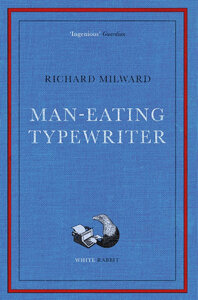Man-Eating Typewriter begins with a foreword by the head of Glass Eye Press, a small Soho publisher. It describes how, in 1969, they were contacted by one Raymond Novak, who claimed that in nine months, he would commit a “fantabulosa crime” that would become the stuff of legend. Novak offered to send Glass Eye the chapters of his memoir, ready to be published as news broke of his crime. The publisher needed money, so here we are.
Novak’s memoir is written in his version of Polari, a form of slang associated historically with (amongst others) fairground workers, the merchant navy, and gay men in Britain. For example, here is Novak talking about the difficulties of understanding the language when he’s been taken into a hostel as an orphan:
For months the lingo-barrier was like banging my tet against the Rosetta Rock and drawing blood. I savvied clear enough twas a specnalji privilege or punishment being dragged in before the Governor and the suits…
I won’t say that this becomes easy to follow as such, but like the version of Old English in Paul Kingsnorth’s The Wake, I found a rhythm that kept me reading. Novak’s life, as he narrates it, becomes more and more extreme and outlandish. But the effect of the Polari is to open up a world in which this life can take place – to establish life on Novak’s terms, not anyone else’s.
The people of Glass Eye Press, though, are starting to feel that Novak’s memoir is a little too close to home. Footnotes chronicle their attempts to find Novak, and we end up with different voices and styles – which is to say, different versions of the world – clashing for space on the page. Milward’s novel is exuberant and well worth diving into.
Published by White Rabbit Books.
Click here to read my other reviews of the 2023 Goldsmiths Prize shortlist.

Recent Comments